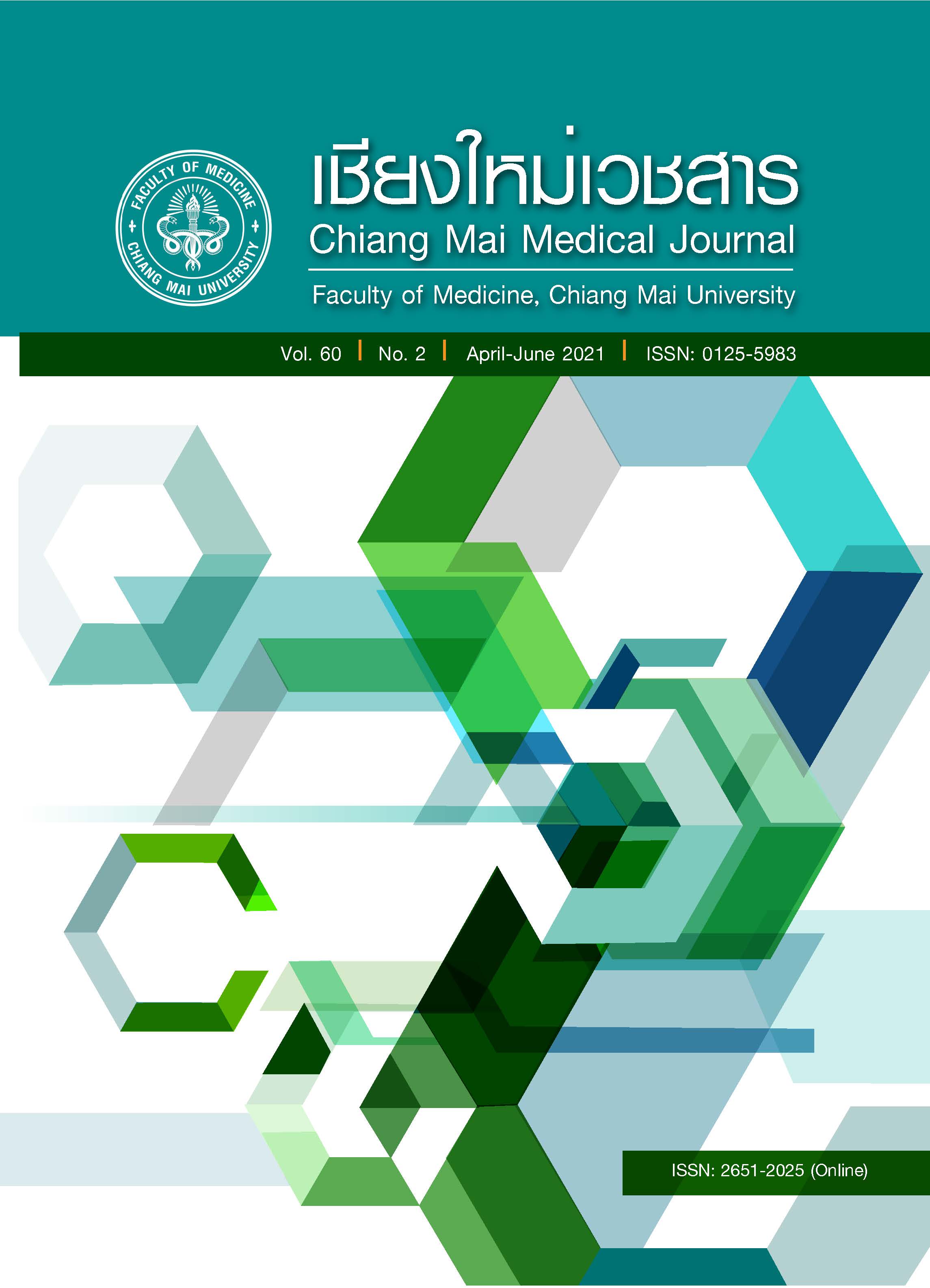Knowledge, attitude and behavior regarding sexual transmitted diseases of male students from 3 faculties at Chiang Mai University.
Keywords:
sexually transmitted disease, knowledge, risky behavior, attitudes, male studentAbstract
Objective To study the difference and relationship between knowledge, risk behavior and attitude of male students from 3 faculties at Chiang Mai University.
Methods This cross-sectional study was studied in 652 undergraduate male students from 3 faculties including Associated Medical Science (AMS), Engineering and Economics, the representatives of Health Sciences, Sciences and Technology, Social Sciences and Humanities, respectively. An online questionnaire was created to evaluate their knowledge, risk behavior and attitude regarding sexual transmitted diseases (STD). Descriptive statistics, one – way ANOVA and Spearman’s rank correlation coefficient test were carried out as the statistical tools.
Results AMS male students possessed the higher knowledge score than others. There were significantly different regarding attitudes of AMS male students in the question “Should parents teach appropriate sex education to young children?” and “You think that early STDs screening is good” (p=0.001 and p<0.001, respectively). Positive correlation were shown between the question “the alcoholic drinking” and “the visiting of entertainment places” in all groups (rAMS = 0.673, rECON = 0.595, rENT = 0.595). Furthermore, average scores of risk behavior of all groups were also positively correlated with the questions “frequency of having sex during the past 2 months” and “alcoholic drinking" (rAMS = 0.510, 0.409, rECON = 0.655, 0.259, rENT = 0.562, 0.345, respectively).
Conclusions Health Sciences male students possessed the higher knowledges, lower risk behaviors, and better attitudes about STD than others. Providing knowledge about STD and campaign of alcohol abstaining should be reduced the risk behaviors and incidence of STD in university.
References
Department of Disease Control. Disease Protection and Control Research Plan 2019-2021. E-book. [Internet]. 2020 Jun [cited 2020 November 17] p. 31 Available from: http://irem.ddc.moph.go.th/book/detail/92
Drago F, Ciccarese G, Zangrillo F, Gasparini G, Cogorno L, Riva S. A Survey of Current Knowledge on Sexually Transmitted Diseases and Sexual Behaviour in Italian Adolescents. Int J Environ Res Public Health. 2016;13:422. doi: 10.3390/ijerph13040422
Folasayo AT, Oluwasegun AJ, Samsudin S, Saudi SN, Osman M, Hamat RA. Assessing the Knowledge Level, Attitudes, Risk Behaviors and Preventive Practices on Sexually Transmitted Diseases among University Students as Future Healthcare Providers in the Central Zone of Malaysia: A Cross-Sectional Study. Int J Environ Res Public Health. 2017;14:159. doi: 10.3390/ijerph14020159
Visalli G, Picerno I, Vita G, Spataro P, Bertuccio MP. Knowledge of sexually transmitted infections among younger subjects of the city of Messina (Sicily). J Prev Med Hyg. 2014;55:17-22.
Saurabh KM, Oudeacoumar P. Knowledge and attitude about sexually transmitted infections among paramedical 1st year students in a tertiary care teaching institute in Pondicherry. Int J Res Dermatol. 2019;5:532-6.
Svensson L, Waern S. Knowledge of and attitudes to sexually transmitted diseases among Thai university student. UPPSALA universitet. 2013 [Internet]. 2020. [cited 2020 November 17]. Available from https://www.semanticscholar.org/paper/Knowledge-of-and-attitudes-to-sexually-transmitted-Svensson-Waern/8867003f20bc1447d406abd6dce766c2ff68ae94
El-Tholoth HS, Alqahtani FD, Aljabri AA, Alfaryan KH, Alharbi F, Alhowaimil AA. Knowledge and attitude about sexually transmitted diseases among youth in Saudi Arabia. Urol Ann. 2018;10:198–202.
Fontes MB, Crivelaro RC, Scartezini AM, Lima DD, Garcia AA, Fujioka RT. Determinant factors of knowledge, attitudes and practices regarding STD/AIDS and viral hepatitis among youths aged 18 to 29 years in Brazil. Cien Saude Colet. 2017;22:1343-52.
Subbarao NT, Akhilesh A. Knowledge and attitude about sexually transmitted infections other than HIV among college students. Indian J Sex Transm Dis AIDS. 2017;38:10-4.
Demis A, Adera A, Workeneh D. Determination of knowledge, attitudes and practices on prevention of sexually transmitted infections among seto semero high school students. MOJ Public Health. 2017;5:142–53.
Ratanalertnavee J, Rasmi A. Prevalence and risk factors of HIV infection among migrant workers with syphilis and sexually transmitted diseases risk behavior: a case study of Takua Pa District, Phang Nga Province. Region 11 Medical Journal, 2019;33:45-58.
Acheampong R. Knowledge, attitude and practice about sexually transmitted diseases among university students in Ghana. Sex Transm Infect 2017;93:A254.
Taber KS. The use of Cronbach’s alpha when developing and reporting research instruments in science education. Res Sci Educ. 2018;48:1273-96.
Lance CE, Butts MM, Michels LC. What did they really say? Organ Res Methods. 2006;9:202-20.
Downloads
Published
How to Cite
Issue
Section
License

This work is licensed under a Creative Commons Attribution-NonCommercial-NoDerivatives 4.0 International License.










